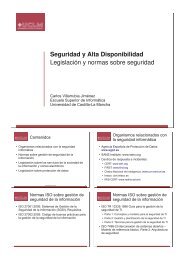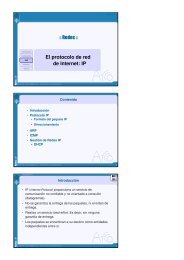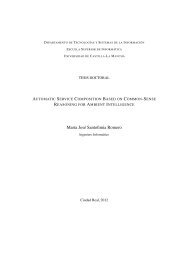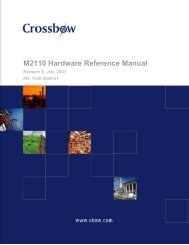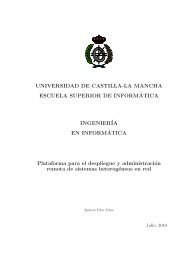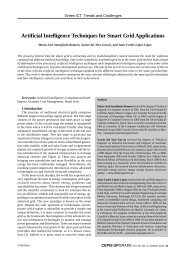Pensar en C++ (Volumen 1) - Grupo ARCO
Pensar en C++ (Volumen 1) - Grupo ARCO
Pensar en C++ (Volumen 1) - Grupo ARCO
You also want an ePaper? Increase the reach of your titles
YUMPU automatically turns print PDFs into web optimized ePapers that Google loves.
✐<br />
✐<br />
✐<br />
“Volum<strong>en</strong>1” — 2012/1/12 — 13:52 — page 208 — #246<br />
✐<br />
Capítulo 7. Sobrecarga de funciones y argum<strong>en</strong>tos por defecto<br />
En el segundo fichero, la función está mal declarada y <strong>en</strong> main se le llama:<br />
//: C07:Use.cpp<br />
//{L} Def<br />
// Function misdeclaration<br />
void f(char);<br />
int main() {<br />
//! f(1); // Causes a linker error<br />
} ///:~<br />
Incluso aunque pueda ver que la función es realm<strong>en</strong>te f(int), el compilador<br />
no lo sabe porque se le dijo, a través de una declaración explícita, que la función es<br />
f(char). Así pues, la compilación ti<strong>en</strong>e éxito. En C, el <strong>en</strong>lazador podría t<strong>en</strong>er también<br />
éxito, pero no <strong>en</strong> <strong>C++</strong>. Como el compilador decora los nombres, la definición se<br />
convierte <strong>en</strong> algo así como f_int, mi<strong>en</strong>tras que se trata de utilizar f_char. Cuando<br />
el <strong>en</strong>lazador int<strong>en</strong>ta resolver la refer<strong>en</strong>cia a f_char, sólo puede <strong>en</strong>contrar f_int,<br />
y da un m<strong>en</strong>saje de error. Éste es el <strong>en</strong>lace de tipos seguro. Aunque el problema no<br />
ocurre muy a m<strong>en</strong>udo, cuando ocurre puede ser increíblem<strong>en</strong>te difícil de <strong>en</strong>contrar,<br />
especialm<strong>en</strong>te <strong>en</strong> proyectos grandes. Éste método puede utilizarse para <strong>en</strong>contrar<br />
un error <strong>en</strong> C simplem<strong>en</strong>te int<strong>en</strong>tando compilarlo <strong>en</strong> <strong>C++</strong>.<br />
7.2. Ejemplo de sobrecarga<br />
Ahora puede modificar ejemplos anteriores para utilizar la sobrecarga de funciones.<br />
Como ya se dijo, el lugar inmediatam<strong>en</strong>te más útil para la sobrecarga es <strong>en</strong> los<br />
constructores. Puede comprobarlo <strong>en</strong> la sigui<strong>en</strong>te versión de la clase Stash:<br />
//: C07:Stash3.h<br />
// Function overloading<br />
#ifndef STASH3_H<br />
#define STASH3_H<br />
class Stash {<br />
int size; // Size of each space<br />
int quantity; // Number of storage spaces<br />
int next; // Next empty space<br />
// Dynamically allocated array of bytes:<br />
unsigned char* storage;<br />
void inflate(int increase);<br />
public:<br />
Stash(int size); // Zero quantity<br />
Stash(int size, int initQuantity);<br />
~Stash();<br />
int add(void* elem<strong>en</strong>t);<br />
void* fetch(int index);<br />
int count();<br />
};<br />
#<strong>en</strong>dif // STASH3_H ///:~<br />
208<br />
✐<br />
✐<br />
✐<br />
✐



